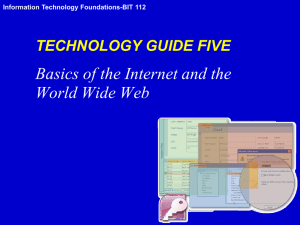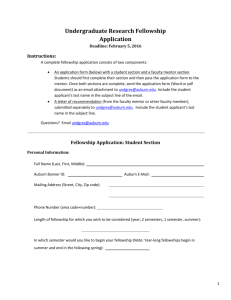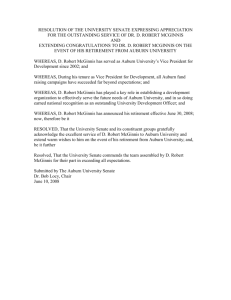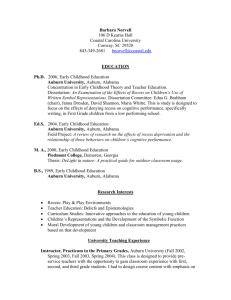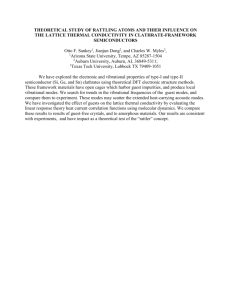ABC Radio National 19th June 2011 Encounter
advertisement
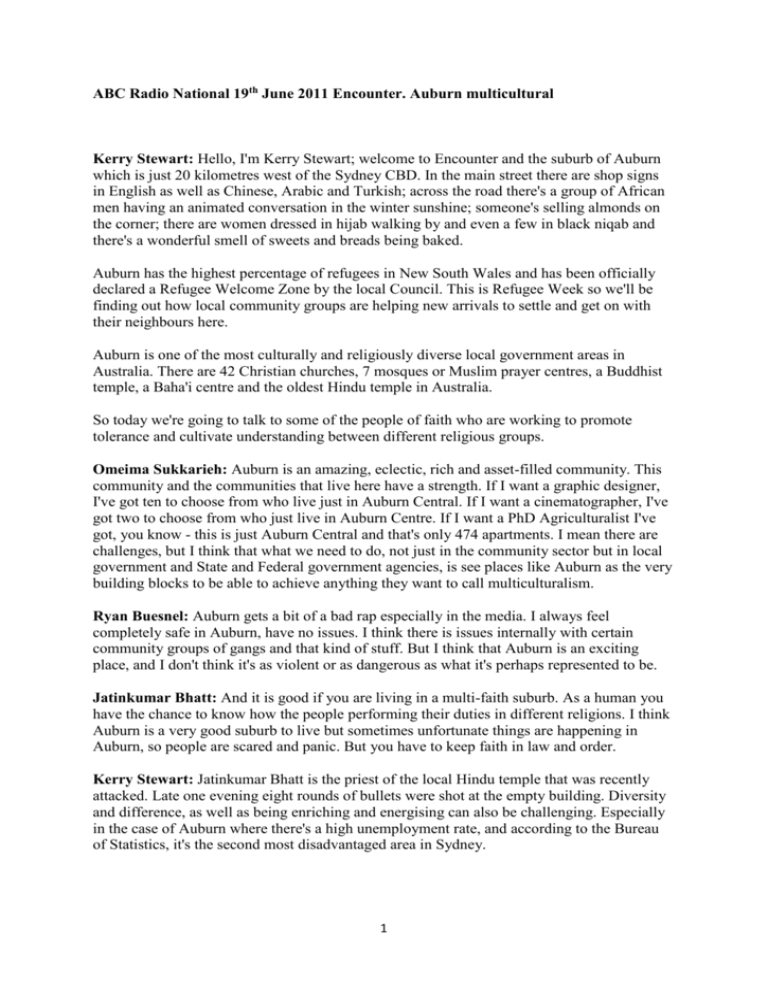
ABC Radio National 19th June 2011 Encounter. Auburn multicultural Kerry Stewart: Hello, I'm Kerry Stewart; welcome to Encounter and the suburb of Auburn which is just 20 kilometres west of the Sydney CBD. In the main street there are shop signs in English as well as Chinese, Arabic and Turkish; across the road there's a group of African men having an animated conversation in the winter sunshine; someone's selling almonds on the corner; there are women dressed in hijab walking by and even a few in black niqab and there's a wonderful smell of sweets and breads being baked. Auburn has the highest percentage of refugees in New South Wales and has been officially declared a Refugee Welcome Zone by the local Council. This is Refugee Week so we'll be finding out how local community groups are helping new arrivals to settle and get on with their neighbours here. Auburn is one of the most culturally and religiously diverse local government areas in Australia. There are 42 Christian churches, 7 mosques or Muslim prayer centres, a Buddhist temple, a Baha'i centre and the oldest Hindu temple in Australia. So today we're going to talk to some of the people of faith who are working to promote tolerance and cultivate understanding between different religious groups. Omeima Sukkarieh: Auburn is an amazing, eclectic, rich and asset-filled community. This community and the communities that live here have a strength. If I want a graphic designer, I've got ten to choose from who live just in Auburn Central. If I want a cinematographer, I've got two to choose from who just live in Auburn Centre. If I want a PhD Agriculturalist I've got, you know - this is just Auburn Central and that's only 474 apartments. I mean there are challenges, but I think that what we need to do, not just in the community sector but in local government and State and Federal government agencies, is see places like Auburn as the very building blocks to be able to achieve anything they want to call multiculturalism. Ryan Buesnel: Auburn gets a bit of a bad rap especially in the media. I always feel completely safe in Auburn, have no issues. I think there is issues internally with certain community groups of gangs and that kind of stuff. But I think that Auburn is an exciting place, and I don't think it's as violent or as dangerous as what it's perhaps represented to be. Jatinkumar Bhatt: And it is good if you are living in a multi-faith suburb. As a human you have the chance to know how the people performing their duties in different religions. I think Auburn is a very good suburb to live but sometimes unfortunate things are happening in Auburn, so people are scared and panic. But you have to keep faith in law and order. Kerry Stewart: Jatinkumar Bhatt is the priest of the local Hindu temple that was recently attacked. Late one evening eight rounds of bullets were shot at the empty building. Diversity and difference, as well as being enriching and energising can also be challenging. Especially in the case of Auburn where there's a high unemployment rate, and according to the Bureau of Statistics, it's the second most disadvantaged area in Sydney. 1 Jatinkumar Bhatt: This is the first Hindu temple in Australia. The name is Sri Mandir, Auburn and it built in 1976. Now it's going to be 35 years old, and I'm very lucky to perform my duties in this temple. Kerry Stewart: Now we're standing at the front door. It's on a suburban street, this temple, lots of traffic going by and planes overhead. But it looks rather traditional, the design, the architecture of the building, but we're standing right near a metal screen out the front. We actually might go inside and you can describe why this metal screen is here, but let's go inside first where it's a little quieter. Jatinkumar Bhatt: Actually we just put in this screen because in past years we have been attacked by some bottlings and eggings, so we don't want to hurt anybody near the front door. Kerry Stewart: People are throwing eggs and bottles in here. This temple is attacked quite often, is that correct? Jatinkumar Bhatt: Yes, I've been performing my duties from last six years and from the very first day to this day several times egging and bottling here. I don't know why the people are doing these things, but it is very unfortunate for Australia and any religious place. Kerry Stewart: And a more serious crime has happened rather recently. Jatinkumar Bhatt: Yes. The attack was done by people by the bullet and any bullet attack it's very scary and panic, and if they missed that target, and if the bullet is going to the neighbours as well. So I'm concerned about these people are doing like that. There is no meaning for that, because any religious place has been attacked don't identify it is temple, it is mosque, it is church, but it is attack on religious things. Kerry Stewart: The Hindu temple is not the only place of worship in Auburn that's been attacked over the last decade. Mehmet Saral is the co-founder and President of the Affinity Intercultural Foundation. It was established by a group of Muslims who wanted to promote dialogue between different religious groups, and to aid Muslim integration into Australian society. Their offices are above a Turkish Delight sweet shop. Mehmet Saral: In Auburn in our suburb, which has got a 25% Muslim population and 37% Christian population, we've had issues with attacks against places of worship. After September 11, after the Bali bombings, after the London train disaster, all these global events have locally caused problems as well. And the Auburn Gallipoli Mosque which is most probably the most beautiful mosque in Australia in its architecture, its splendour, was attacked. They actually threw a molotov cocktail into the mosque and they also threw a pig's head on the outside of the mosque, and they also put the word "terrorists" in front of the mosque, they vandalised the mosque walls. These events obviously caused a problem for the mosque and the congregation of 2,000, 3,000 people attending a week. So what they did was the best thing for us to do is keep 24 hour vigil. People took turns 3/4 hour shifts each, six people at a time keeping guard around the mosque. They saw a lot of cars going past and screaming out 'Terrorists!' etc., but obviously those cars didn't stop, they just went because they saw people there in the mosque. So that continued for about six weeks of guarding the mosque and then it stopped, and the mosque committee did notify the NSW police and AFP to let them know that this was happening, and police have done their best to help the situation. And after those incidents, the next attack that occurred was about two weeks after 2 the Cronulla riots. The Uniting Church Hall was burnt down in Auburn, and the following day when the media came spoke to the then Moderator, Jim Mein, they asked him, 'So, did the Muslims do it?' and he said, 'That's nonsense, we have a great relationship with the Muslim community here', and the media straight away created the hate campaign. Not every media outlet have been very good ones like the ABC and The Sydney Morning Herald have been very balanced. But there were others who haven't. A couple of weeks later, my organisation and a few youth went to the church on Ash Wednesday and the youth had collected $500 amongst themselves and gave that as a donation to the church hall for the rebuilding of it. They had the Ash Wednesday service, and we spoke a few words; it was a really friendly environment. The Uniting Church Auburn parish is predominantly a Tongan community and it was maybe the first time dialogue was done between that community and Muslims. And that dialogue has continued, that the church Minister and others have been invited to Muslim homes in the area for Ramadan Iftar dinners and it's been reciprocated by others. For instance, during Christmas the some of the church groups have called us to their homes for a Christmas lunch. We even played cricket outside after lunch. TONGAN CHOIR LEGONI Mele Fakahua-Ratcliffe: Singing is very much part of our life. We sing all the time when we're happy; we also sing when we are sad, and we think that the church service on Sundays is not complete unless there's a choir. TONGAN CHOIR LEGONI Mele Fakahua-Ratcliffe: I am Mele Fakahua-Ratcliffe. I'm originally from Tonga. I am a Uniting Church minister. I have been called to Auburn in the year 2006, and I am responsible for three congregations in Auburn, which is now predominantly Tongan. I think coming to Auburn has really enabled me to step out of my comfort zone to interact with people of other faith. It's never been part of my Christian journey until I came to Auburn. Not only that, it's been encouraged by my church, the Uniting Church, to make it a deliberate part of the mission, of my mission here, and the people here in the parish. I have been to mosques in the past as part of my training; I've been to Hindu temples, I've been to Buddhist temples, and that was a good exposure, but then, unless you're in an area like Auburn where you are thrust into it, sometimes you have no choice, you have to deal with it and get on with it. And I think it's only enriched my own faith, enabled me to get to know my own faith better when I interact with people of other faiths. Kerry Stewart: What's happening? Jatinkumar Bhatt: We are welcoming to the devotees here, as the devotees are coming to the temple we just put tikka on their foreheads and I am reciting the slokas... CHANTING Kerry Stewart: So you've just come in for a blessing? Man: Yes, we are actually from Nepal, we are the same religion Hindu, so came here to worship. 3 Kerry Stewart: So you're just visiting from Nepal. Man: Yes, my parents just came from Nepal yesterday so we came here to visit some temples. Kerry Stewart: So you're living in Auburn are you? Man: Actually living in Lidcombe. Kerry Stewart: Another suburb close by. Man: Close by yes. Kerry Stewart: And do your parents speak English? Man: No. Kerry Stewart: OK, could you ask them if they enjoy this temple? They've been looking at the deities here in the walls, we've noticed while we've been doing the interview. Man: (LANGUAGE) They are very happy to visit because it's in Australia, so maybe people don't think that temples are here in Australia, so they're very happy to visit the temple. Kerry Stewart: It's nice to meet you. Thank you. Jatinkumar Bhatt: We have each and every deities in this temple. Look, you never see the God, I never see the God, this is our feeling, there is one God, in any form. You say Ram, you can say Vishnu or you can say Shiva, you can say Allah, you can say Jesus, but it is a God and we have to have faith in our God, but you can pray in different ways, different forms. Kerry Stewart: Auburn Diversity Services is a community based, non-profit organisation committed to addressing the needs of migrants and refugees. It provides services that help to educate, house, employ and settle people in Australia. One of their projects is called Belong in Auburn, and it's managed by Mariam Nour. Mariam Nour: The Belong in Auburn project is aimed at encouraging community spirit, encouraging connection, resourcefulness, respect and trust within communities and between communities in the Auburn area. The project comes with its challenges but it also comes with its great experiences. Kerry Stewart: So what's your cultural background and what do you have to offer the people you help? Mariam Nour: I'm of Egyptian background. My mother was Egyptian and my father was of various backgrounds, Turkish, Syrian and Lebanese, but he grew up in Egypt and therefore I speak Arabic and know mostly of the Arabic-speaking cultures. Kerry Stewart: And are you Muslim? 4 Mariam Nour: I'm actually Christian, so my father's forefathers were in Turkey and came to Egypt and my mum has always been in Egypt and she's Orthodox and my Dad's Catholic. And in my experience, having been overseas to Egypt, I really had a greater awareness of Islam and a great appreciation for Islam. I would stay in a Muslim family's home. We've known them for a very long time and they were really hospitable, beautiful people, and they taught me a lot about Islam and I think from them, I brought that with me as an adult. It's really shaped my view of myself and of my culture, and of my understanding of religion and spirituality. And bringing that to Auburn, it makes such a difference to how I view things and what guides my principles in working in Auburn and how I conduct myself with people on a day-to-day basis. The people that I come across can sometimes have different views to me. They can believe sometimes that if you're not Muslim then you couldn't possibly understand anything about God or you couldn't possibly relate to them, or they couldn't possibly talk to you because you might, maybe have a different understand than them. And I guess I'm able to relate to people because I can talk to them and they wouldn't even know whether I was Muslim or Christian. And I think sometimes once they find out that I'm Christian it doesn't matter to them after that because they just feel like they have already related to me. Sometimes people think that it's a barrier, but religion is no barrier, because after you've had such a down-to-earth conversation with somebody, you really come to appreciate the person for who they are and not what they're affiliated with. I've learnt a lot from being in Auburn. I was very scared at first, coming to Auburn, I felt very threatened and very weirded-out by all the different people, there was just such a - it's a mixing pot. It's a mixing pot of cultures and traditions and religions and at first I was just taken aback by it, but then I started to open my eyes to the beauty there is in that, and I started to realise that they're not just different people, they're people, and they all have different stories and they have beautiful stories and some have scary stories, and it's amazing. I've come to really love Auburn. Kerry Stewart: Another group providing services for the local residents, is the Auburn Community Development Network. Omeima Sukkarieh is the manager, so does her cultural and religious background impact on her interactions with people who live here? Omeima Sukkarieh: I'm Lebanese and I'm of Muslim background. You'd think that was easy in Auburn and it is a little bit, but it's still hard because of the complexities: you've got Saudi Arabian communities who are very new to Australia who - I'm using them as an example of course, because they're one of the most recent, but we as, even myself who has been here for over 30 years, has a perception of a particular community. We only know what we really hear on TV or what we think we know, or what we perceive to know. And it's not until you really start talking to people and communicating with them, and engaging with them at a meaningful level that you start to realise that your perceptions are thrown completely out the window, and you've got to start afresh and start to learn what the diversity is within one particular community, such as the Saudi community. The diversity of the language, the diversity - there's so much community politics. You've got people from Afghanistan here from diverse ethnic backgrounds, and that's not religious-based conflict, that's conflict that exists for racial or ethnic reasons and that's coming from overseas. And while it doesn't manifest here in Australia, you still as a worker need to be completely respectful and at least understanding of that diversity. Otherwise you can get yourself into a lot of trouble. 5 Woman: OK, now we're going to sing a Good Morning song in different languages. Also we are going to clap as we sing. Yes, OK, let's start. KIDS SINGING AND CLAPPING GOOD MORNING SONG Mariam Nour: We have a multicultural playgroup targeted at the very young. I really like the saying "intolerance starts young", but the multicultural playgroup is actually quite successful. You can see that the children are enjoying themselves, the mothers are enjoying themselves and they don't sit in their little groups, and it's nice for them to sit in their little groups, but they also like to mingle amongst one another, and there is no 'I' or 'You', it's 'Us'. And we also pick a country that we're going to go to on that day, and then we read a book, a cultural story from that culture that we're going to visit. We explore themes related to the story or that culture. They like it, they love it. And I think that's for me, is very encouraging; it feels like we're doing something. We're making a difference, and those barriers are being broken indirectly without very much effort at all. You find that mothers are so excited to meet other mothers of all different cultures. They just want to make friends, and sometimes it's even to escape the boundaries and the barriers that are put up in their own culture sometimes. When they come to multicultural story time, they've expressed that they like the fact that they don't belong to any particular group, and they're happy to just make friends. Kerry Stewart: Mariam Nour from Auburn Diversity Services and the kids' playgroup singing the Good Morning Song in English, Arabic, Farsi, Karen, Hindi, Tamil and Mandarin. On ABC Radio National you're listening to Encounter which is coming to you from the multi-faith Sydney suburb of Auburn. Teaching small children about other cultures is indeed valuable, but what happens with teenagers here? Najeeba Wazefadost. Najeeba Wazefadost: As a youth support officer working in Auburn Diversity, I have come along with many Afghan youth, that they have had problems. They say 'I'm going to school and loving the atmosphere around me and it's just beautiful to learn about different food, different religion, the history of for example Anzac Day, and then when I come home I have my own culture that I also need to keep within me.' So sometimes they're confused, they're still trying to find out where they fit in. Ryan Buesnel: Can we have the music off for a second. OK, welcome boys; we're here at the Granville Boys High School and Auburn Youth Centre Get Ready Program, the first one for term 2. We are joined today by the fabulous Mirma from MTC Works Solutions in Bankstown who's going to be joining us for the whole of this term as we work on the music and film project together. So, what I'd like you to do is just go around the room and introduce yourself and say hello to Mirma. Boy: Hello, my name's (inaudible) Boy: Hi, my name's Emad Boy: Hello, my name is Jonah 6 Boy: Hello my name's Serge. Boy: My name's Aaron. Mirma: Hi guys. OK my name is Mirma, I'm Lebanese so I understand the Arabic language, so careful guys (laugh). I come from MTC Work Solutions. I am the multimedia artist and facilitator, so I'll be filming you guys and creating with you guys a videoclip with Ryan, who's going to be producing the music, and we'll be producing the video side to it. Ryan Buesnel My name's Ryan Buesnel. I'm the Youth Work Co-ordinator here at Auburn Youth Centre. Granville Boys High School program is called Get Ready. It started in 2007 in collaboration with Granville Boys and Auburn Youth Centre. The Granville Boys that come here are students who are at severe risk of disengaging completely from school, and there may be mild intellectual disability as well involved and also anger-management issues and stuff. So the thinking was that we could offer a program here that combines sort of recreational and educational life skills content for four hours a week, which would go towards their school credit and so forth. So, a couple of you said you liked music. I've heard you all at various points listening to hiphop on UTube and stuff, so is it fair to say that you all love hip-hop? A COUPLE OF 'YESES' Ryan Buesnel: What about in terms of these hip-hop songs, do you pick up on what they're singing about? The lyrics? Boy: Yes, they talk about their lives and that.... Boy: Guns. Ryan Buesnel: Ah, good one, excellent. I was waiting for that. Guns and weapons. Smoking what - ? Boys: Drugs. Weed ... Kerry Stewart: Do the boys that come here, they come from religious backgrounds, and do they know about their religions? Do they have a relationship with their religions? Ryan Buesnel: The boys here come from a number of religious backgrounds. In my experience it's something that's not spoken about a whole lot. It more happens in conversation when you're doing something else, so like on a school holiday excursion for example, we're sitting on a bus together driving to the pool. You know, 'What did you do on the weekend?' 'Oh, I played drums in church.' 'Oh, cool. So you go to church a bit?' Yes, yes, yes, I play drums in the band.' So the conversation's alongside a young person rather than direct 'Let's talk about religion'. It's really interesting the dichotomy I think between inherited religious traditions and sort of the way lives are lived, and some other attitudes. We had some people here and we had a barbecue on, and around the barbecue the young people were having a conversation, a group of boys, about girls, and they were using some very derogatory terms which is apparently normal. But then when it came to sort of have the meat, they wanted to know if it was halal. The assumption that it's OK to talk about girls as being this, doesn't 7 seem to register that that might be not congruent with their faith. Or worse, they might see it as being congruent with their faith. Kerry Stewart: Do you pull them up when they say things like that? Ryan Buesnel: Absolutely we do. Yes. It's not like I'm expecting when I say, 'Well, don't you think that's a bit weird that you worry this is halal when you've just spoken about another of God's creations like that?' I'm not expecting when I say things like that, for attitudes to be changed, it's more an ongoing process of just little by little presenting different views and triggering different thoughts. 'Oh, not everyone thinks this way. Some people have different views. I wonder why?' That's the goal. We are a secular youth centre, although we have people on staff from different religious traditions. We very much promote tolerance and acceptance and dialogue as well. We've had some instances in the past of religion, for example, being an issue with some young people who drop in and that runs counter to our philosophy here and so we've had to deal with that. Kerry Stewart: What was that, and can you elaborate on that? Ryan Buesnel: The last three times, these are the only three in the time I've been here, it's been Christian and Muslim relationships and there being a bit of tension, and some derogatory stuff being said that's escalated into punch-ons. Kerry Stewart: How do you deal with that? Ryan Buesnel: Well, a moment of honesty here. According to our policies, if a punch-on happens, I'm meant to stand back and watch it happen. But this one turned nasty and I can't explain it, just my initial reaction was to get in the middle of it and break up the punch-on because it was involving other people. A table got broken, things got turned over, a girl got knocked over in the fall, so I broke up the fight and then I said to them both, 'Come with me', and we went and had a mediation session, and I started to get them to talk about what their faith meant to them and how important it was to them, and I highlighted some similarities between what they were saying. And I said, 'Don't you think that it's much better to concentrate on those similarities here and respect that you both have different traditions, but these are the common ground, and both of these traditions talk about the importance of respecting others, and not being violent and that kind of thing, so, and they shook hands and the next day they were best friends. It was weird. But there hasn't been a problem with those two since. Have a look at all those things on the board there that we've listed. So this is all hip-hop themes - cars, motorbikes, dancing, nightclub, parties, money, drinking, girls (wrong representation), gangsta (that's with an 'a' at the end by the way), feeling superior, guns, weapons, smoking, drugs and gambling. Another word is 'rich', like in how if you're not rich then you're somehow not as good. Boy: You ain't got nothing. Ryan Buesnel: You ain't got nothing if you don't have cash. So the next question I'm going to ask requires you to be very honest with yourself. You don't have to share details, but all 8 those things listed on the board, how many of them are really relevant to you? How many of those things represent your life at the moment? Kerry Stewart: So Ryan, why are you involved with these boys? Why are you doing this work? Ryan Buesnel: I grew up - my dad is a Minister and I had a lot of anger as a teenager, hated that he was a Minister for a lot of it, and I guess I resonate strongly with feeling like you've got this thing that's part of your identity but you hate it at the same time. It wasn't until years later I ended up studying theology. It wasn't a calling of god, to study theology, it was something to do and I started it and found out, Hey, I'm really quite good at it, and I loved it. But I started to have just this nagging sense that there was such a big separation between theological reflection and the audience of theology, which is white, middle-class people that have the luxury of being able to read books, and the luxury of being able to reflect endless on ideas. Such a big difference between that and practical experience with people in the world. And I heard through a friend about this job at Auburn, and I knew about Auburn as a community. I thought it would be challenging to my theology, for a start, to come and work here, to say, 'OK, you know, I've read all these people; what does that actually mean in such a context like Auburn, where you're one faith amongst many?' So that was really challenging. And great, I must say. But it also really cemented to me the real passion for work with those people that are marginalised and that are going through a really crappy time because of situations that are out of their control most of the time. And I still read theology. I read it differently now. I read it with a sense of irony almost. I read some theology for comedy. I resonate still, I guess, with liberation theology which, from the Catholic tradition with oppressed groups in Latin America, that's a branch of theology that I'm still very much interested in. And I'm also - I read a lot about Islam. I'll go down on record as saying Islam still confuses me greatly. I very much like aspects of Islam and I'm very confused on other aspects of it as well. QUR'AN RECITATION Kerry Stewart: Imam Bilal Aksoy from the Auburn Gallipoli mosque, reciting the Qur'an. In response to the rounds of gunfire aimed at the Sri Mandir temple a couple of months ago, Mehmet Saral from the Affinity Intercultural Foundation arranged Muslim, Christian and Hindu leaders to speak publicly about peace and harmony in Auburn. Mehmet Saral: We had this very important sheikh, Imam, coming out from Malaysia, who's a descendent of a very great Muslim Sufi saint, Abdul Qadir Jailani. We thought it would be a good opportunity to ride on this great speaker coming and explaining how Islam feels about these things. Islam doesn't allow attacks against a places of worship or attacks against any human being. One life in Islam is very precious, it doesn't matter whose life it is. You know, killing one person according to the Qur'an is like killing the whole of humanity. Saving the life of one person is as if you have saved the life of all of humanity. And last night's event we brought those Hindu religious leaders and the Uniting Church Minister, as well as the Auburn Gallipoli Mosque Imam together in unity, shoulder-to-shoulder, arm-in-arm condemning these attacks to prove to everyone out there who doubts it that people of faith in Auburn have no problems with each other. We coexist without any issues whatsoever. Islam has always been a religion that portrays dialogue with other faiths because in the Qur'an it says very clearly in Chapter 49 Verse 18 says we were created from Adam and Eve into different nations and tribes so that you may get to know one another. So the Qur'an tells us we must do 9 intercultural dialogue, interfaith dialogue. It's an obligatory act upon Muslims. The people who are doing these attacks, who have done it to the mosque, who have done it to the Uniting Church, and to the Hindu temple, have all done it in the name of crime. These are criminals. No matter if they're called Raj, Mohammed, Ali or Kevin, or John, it doesn't matter what their name is, they're all criminals. TONGAN UNITING CHURCH CHOIR Mele Fakahua-Ratcliffe: I think what Jesus said when he was asked what is the greatest commandment, he said to love God with all your heart, with all your mind and with all your soul, and to love your neighbour as you love yourself. If you do that, according to Jesus, you will fulfil all the law. And I think it is true, because you can't claim to love God and you hate your neighbour, because God and neighbour, I like to think of as the two sides. They're not the same but you can't do the other without the other. And I think if you have that in your heart and you believe that is the greatest commandment, then you can relate to every human being as your neighbour. Your neighbour is not necessarily the person who looks the same or speak your language or eat the same food as you are, they can be strangers that you meet on the street, or the shopping centre. And I think if we all have that knowledge and live by that knowledge, then I think it is easy to go across from one culture into another or one's faith into the other. Because you will see the image of God in every person. Kerry Stewart: The Affinity Intercultural Foundation has initiated many projects that bring people together with the intention of cultivating understanding through conversation. Mehmet Saral again. Mehmet Saral: We had home encounters program, Christian-Muslim home encounters where five Muslims and five Christians would go into a home and they'd discussed each other's respective faith traditions on six different topics like family and marriage, spirituality, monotheism, prophethood etc., we'd alternate one month in a Christian home, one month in a Muslim home. It was a two to a two and a half hour session every month. It went for six months, at the end of it, very close bond of friendship was formed and those families visited each other. So that was called Christian-Muslim home encounters but then we did one HinduMuslim home encounters where we had Hindu youth and Muslim youth meeting once a month, over a six month period, and the topics were different. Obviously family and marriage was there for both; spirituality was there for both; so we done one like that and I think we can continue to the temple in Auburn as well, that would be good. Kerry Stewart: And how do your neighbours respond to these acts of violence? Because they may be very frightened too, I mean how do they get on with you, as a family, as a Hindu family living next door. Jatinkumar Bhatt: The neighbours are very good. The neighbours are very loving, and they are very co-operative. Our neighbours give that good support and they're counselling to my family as well. 'We are here, don't worry', because I am the priest I have to perform my duties in different places as well. So they are telling please 'Don't worry for your family; we are here, we are looking after them.' Within these two streets we have two or three Muslim friends, they are also coming to the temple, and they also give me support. We have the Christian neighbours, they also are supporting us, and they are used to coming to the temple and we invite them when there is a big festival. So they're very familiar with us. 10 Kerry Stewart: The Sri Mandir temple and the priest's house beside it, are set on suburban blocks between weatherboard and brick homes a little way from the centre of town. In comparison, the Auburn Central complex consists of high rise buildings, which contain 474 apartments and a shopping centre. So let's look t how neighbours interact with one another in such close quarters. Omeima Sukkarieh is the Manager of the Auburn Community Development Network, which is on the ground floor of Auburn Central. Omeima Sukkarieh: This place was marred by very negative media attention because of some very serious incidents, so a few years ago there was a murder in the complex. There's been a history of vandalism and it's a space where young people just hang out, which is good, but it's the problem with the space of course is that it lacks a lot of recreational or youthfriendly facilities. So what we did was, because we're a part of the space, and we kind of felt a sense of ownership of trying to go out there and learn a little bit more about who our neighbours are, to try and create a sense of space and a sense of place for the actual communities that live upstairs. Of course one of the major problems is nobody knew who lives upstairs, so there was no indication of the demographics. Who are they? Where do they come from? How long have they been here? And 474 apartments is quite a large number. So what we did was, we launched a project after a couple of years of research called 474 Stories High. So the idea was that we would try and talk to as many people as we can and engage communities in various activities. So we did a series of community barbecues, we even did karaoke, outdoor karaoke, we did table-tennis competitions, outdoor tea salons which is basically just taking somebody's living room and simulating it in an outdoor space and serving tea, because what we knew in Auburn was that so many people, if not everybody, drinks tea, but nobody drinks it together. So certainly in Auburn Central what happened was quite overwhelming. 474 MUSIC - Tarek Sawires Saleh Saqqaf (LANGUAGE) Dear Brother, I have no feeling of homesickness; no problem of finding my type of food; no problem if I speak my language in the streets of Auburn. Halal food is easy to buy, mosques are everywhere, women wearing hijab are walking in the streets with freedom. Coffee shops are serving argilla. In the streets of Auburn you will see faces from different places. I think the world is living in Auburn. Dear Brother, I hope your application for immigration to Auburn will be successful. Best regards, Saleh Saqqaf. Kerry Stewart: So who did you find, who was drinking tea, who was playing table tennis? Omeima Sukkarieh: Well what we found was that the demographics upstairs, or the stories I should say, of the people who live upstairs, come from - there's a significant proportion of international students, almost half of the population living upstairs are easily from the Asian continent, most of them are from China. Most of them are young who live upstairs. There are quite a significant number of families, including Iraqi and Afghan refugees. There's a large Arabic-speaking community, so they would make up most of them, apart from the Iraqi families, are international students from Saudi Arabia, from Egypt, or from Jordan. There are Koreans, and there's quite a large number of Indian and Pakistani, so the Indian subcontinent, and a few Bangladeshis. And together what it makes is a very interesting conversation over a cup of tea. 11 What we found quite fascinating is that we found people building relationships with neighbours they didn't even know they had. So not long ago at one of our barbeques we met this man - I was actually just watching them trying to have a conversation of course, because English is limited, and it turned out that they were literally right across the hallway from each other and they'd never known that. The other interesting thing I found is that you've got so many of the men upstairs who are Muslim for example, and there is a significant proportion go and pray at one of the local mosques together, and you'll see them walking around and they'll be walking from the same direction coming from the mosque, and then they'll disperse into their own apartments. So you have conversations between people who share a common faith who never knew each other, and would guess at what their cultural background is. So it's like, 'Oh, you're Afghani? You look a bit Chinese', you know, and it's those kinds of conversations that you're hearing, and we try and engage in them but more often what we do is that we're serving the tea, we're kind of coming in at a point where we can start asking questions about what is it then that you feel like you need us to help you with? And for most people it's like you need to do more of this stuff. I need to know who lives here, and this is my neighbour. Kerry Stewart: Najeeba Wazefadost was a child when her family escaped Afghanistan and came to Australia by boat. That was 11 years ago, and now while she's studying for her second degree at university, she's also working as an Afghan youth support officer at Auburn Diversity Services. Najeeba Wazefadost: Leaving my country, Afghanistan, was one of the most hardest decisions for me and my parents to make, but we took on that decision because in order for us tolive, in order for us to stay alive was to come to Australia. So being through the sort of experiences in trauma and war under persecution in Afghanistan, has given me a broader view of what people go through. For example, when I had somebody coming after me and talking about settling well in Australia, coping at High School, because they never have had access to education, or things like that I could relate myself to, and it was easy for me. From my own personal experience I remember that my initial arrival in Australia was a culture shock. When I actually went into a school where there girls and boys mixed I actually started telling myself 'Wow! Where am I?' because that was something that in my country I wasn't allowed, due to religion. Our schools were always separate if there was a school. And religion does play an important role in people's life I believe, but what I have learnt, once again living in Australia, living as an educated woman in Australia, that doesn't matter what religion people have in Auburn, they respect one another. Actually that religion sometimes brings them closer to one another. They do not use religion as a tactic or as a politic to play something along. They've learnt that regardless of what religion you are you need to respect people because that's what Australia has to taught me and my community. HANDBELL RINGING Kerry Stewart: Let's go back now to the Sri Mandir temple. After the attacks earlier this year, the Hindu community has been assessing whether to leave Auburn and relocate the temple, or not. Resident Priest Jatinkumar Bhatt. Jatinkumar Bhatt: A lot of people wish to move this temple from here. A lot of people are telling that we have to keep this temple here. We leave this issue on the community because this is a community temple. Community have made one committee, and committee is going 12 to be taking the decision what we have to do. But as a Priest and as a human being, where we can go, because this is a problem we are facing from the last several years, and a lot of people like the police, and a lot of authorities are working on that, to resolve this problem. We have to give them some time to dissolve this problem. If we are moving from this place to the other place, it is insulting of the police, it is insulting of the Council of Auburn, it is insulting of the Australian government, because only a problem is there and we are moving. We have to keep faith in the law and order. And sometimes this place is known as the first Hindu Temple, and it is a very sad thing if we are moving from here. Personally, as a Priest, I'm not believing we have to move from here. Omeima Sukkarieh: From my understanding over the last few years of working here anyway, there's never been a religious based clash. But there's certainly racism, and I think that's a natural thing to happen for people who don't have the knowledge about who other cultural groups are, and what I think is now starting to happen is that people are a lot more comfortable in asking the hard questions that they normally wouldn't ask before. So just at the shopping centre the other day this little girl, she's Anglo-Australian this little girl - I was in their shopping line, and she points to this woman who is wearing a burkha and she says to her mum, 'Mum, why's she got that on her head? Like, what's wrong', this is the little girl, I think she was no more than 5 or 6 years old and the mother was really lovely. The mother apologised and the woman said to the mother, 'Oh, don't worry. She's a child, of course she's allowed to ask.' And this woman had a conversation with the other women, the mother and the woman had a conversation, I was in the line, about why she wears the burkha. And really interestingly, the mother of the child right there and then explained to the girl what the woman had said in basic English to a child. And added at the end, 'You know, you have to be careful, like you have to ask questions really nicely; don't point at people, it's really rude', and I think that's really important because it might have taken a child, but it's good to know that people are comfortable with having those exchanges and that's in a shopping aisle, you know, waiting to be served. It's just that breaking that kind of barrier, it's a very fine line, and all takes is a really nice question, and I always encourage people to ask questions, because most people, if not everybody, you'll find will be happy to answer them. MUSIC - Tarek Sawires Kerry Stewart: Omeima Sukkarieh from the Auburn Community Development Network. That brings us to the end of this Encounter. My thanks to the people of Auburn for answering all my questions. You can find details about this program, a transcript and some photos of the suburb and the people who live and work here on our web site. Technical production today was by Timothy Nicastri and Judy Rapley. I'm Kerry Stewart and it's been good to have your company. 13
